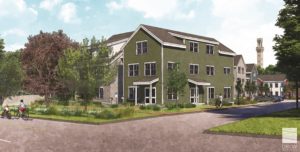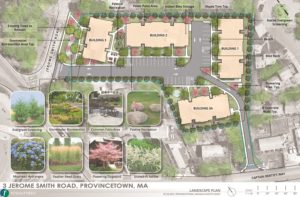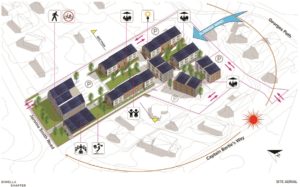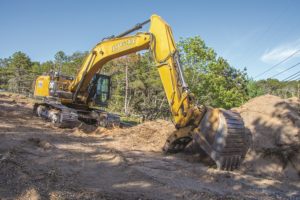PROVINCETOWN — The Community Builders, the Boston firm that built 50 apartments at Province Landing on Shank Painter Road 10 years ago, has won the bidding to construct affordable housing at the former VFW property. The select board chose the winner over two competitors on Monday.
The Community Builders (TCB) was selected in part because it offered the best mix of units across a range of incomes, according to Town Manager Alex Morse and members of the special review committee that examined the bids. The other bidders were Pennrose Inc. of Philadelphia and Commonwealth Community Developers of Cambridge.
Later in Monday’s meeting, the select board declined to endorse a reallocation formula for proceeds of the town’s newly expanded rooms tax until three committees can examine the question further. The rooms tax on hotels was expanded to cover short-term rentals in 2019, and there is wide agreement that some of the new revenue should be directed toward future housing efforts.
Questions remain about how much new revenue there is and how to divide it, and select board members said they wanted to hear from the community housing council and the Year-Round Market-Rate Rental Housing Trust again before proceeding.
TCB at VFW
The review committee recommended the Community Builders based on its “experience and ability, their familiarity with Provincetown, their ability to secure the financing they’ll need, and their proposed unit mix and affordability levels,” Morse said.
“This was the only proposal that included a small number of market-rate units. There is also some synergy with their parking and other facilities at Province Landing,” which is a three-minute walk from the VFW site, Morse said.
“We wanted to see a mixed-income community that met the needs of all income bands in this town,” said review committee member Austin Miller. “This proposal was the one that most robustly addressed that.”
TCB’s original bid specified 47 units, or 57 if the adjacent parcel at 55R Captain Bertie’s Way were acquired and added to the property. That half-acre parcel is now under contract to a private buyer and no longer available for this project, according to multiple sources.

The 47-unit version of the proposal was designed within the town’s existing building height limits. Morse said that “TCB did send us a follow-up after their interview. Depending on height restrictions, we could go up with the number of units.”
Select board chair Dave Abramson, who also served on the bid review committee, said the same thing. “We could probably add more units, depending on which process we move forward with,” Abramson told the board. “This was one of the only proposals that hit all income levels that we said we were looking for.”
“I also want the public to know that, with this vote tonight, by no means is the project a done deal,” Morse added. “It depends on financing, site plan review, and a number of inflection points where the public will be able to be involved and ask questions. We’re also encouraging TCB to talk to the neighbors about site design, buffers, things like that.”
The select board voted 4-0 to give TCB the nod. (The fifth member, Bobby Anthony, was absent.)
Rooms Tax for Housing
When it came to the town manager’s recommendation on how to divide the increased rooms tax revenue, however, the select board was not ready to take a vote.
Before the rooms tax was expanded to include short-term rentals, it covered only stays in “traditional lodgings” — hotels, motels, campgrounds, and bed and breakfasts. That revenue stream, which averaged about $2.1 million per year between 2016 and 2019, increased dramatically when the state legislature expanded the tax to cover short-term rentals starting in July 2019.
Rooms tax revenue went to $3.1 million in fiscal 2020 and $3.5 million in fiscal 2021. The Covid pandemic fell across both of those fiscal years, however, and data provided by the state Dept. of Revenue (DOR) show that revenue from traditional lodgings actually decreased to $1.4 million during fiscal 2021 (the 12 months from July 1, 2020 to June 30, 2021), while revenue from the new short-term rental part of the tax was $2.05 million in those 12 months.
Town leaders have been talking about using short-term rental tax money for housing for years. Exactly how much there is, and how to carve up the rooms tax so that existing beneficiaries remain funded while new money goes to housing, has been discussed at several select board meetings this year.
The town manager’s recommended allocation formula, which he presented at a joint meeting of the select board, housing council, and Market-Rate Rental Trust last week, is based on a $3.4-million revenue forecast going forward. It would allocate 26 percent of the total rooms tax revenue to housing. If the total collected were $3.4 million, that would come to $884,000 per year.
That would be both a brand-new investment in community housing — and, according to state tax data from the DOR, less than half of last year’s short-term rental tax revenue. Three members of the select board said they were not ready to vote.
“I would like to give the committees another chance to discuss it,” said Leslie Sandberg. “Some people have ideas about maybe capping the tourism fund. It’s interesting, some of the things that are coming up.”
“As Leslie said, what kind of ideas do we have around getting the maximum amount of money to that [housing] fund,” said Abramson, “without cutting off the others. The revenue estimates are very conservative.”
“I agree,” said Louise Venden, “and I’m glad my colleagues agree. I don’t think we have had a chance to go thoroughly through all of this. For instance, when we are talking about the amount going to the sewer fund, we are getting $480,000 per year for 10 years” through a county loan forgiveness award.
“We need to put all the cards on the table here, in terms of what are the other funding sources,” Venden concluded.
“As we said last week, this is not the only source of money that is going to go toward housing in this town,” said Morse. “When people see an initial number, whether it’s $800,000 or $1 million, the idea isn’t to go out and buy a condo or single-family home at market price. This is about a subsidy, to get private developers to invest, and make a project with higher density more possible.
“Obviously this money can also be used toward buydown programs and other programs we discussed last Monday,” Morse added. “We do have time to continue the conversation.”
The board voted 4-0 to direct Morse to draft a slate of housing proposals for spring town meeting that the three boards could discuss at their next joint meeting.




